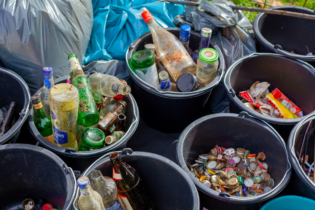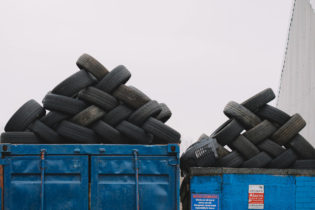By Frances Ringwood
Experts claim that disposable nappies take up to 500 years to biodegrade, making these one of the most intractable materials regularly deposited in landfill sites. Vanishing reusables In South Africa, some of our mothers and grandmothers will remember the days when reusable nappies were the only option. In the KwaZulu-Natal town of Gilletts in the 70s, for example, there used to be vans that came around once a week to collect diapers for washing, dropping off a clean load before pulling away and driving to the next stop. This was much the same as the old milk-bottle reuse service. Today such services still exist but they are comparatively much smaller and more expensive because economies of scale can no longer be easily achieved. This is largely because of the convenience of disposable nappies, which compel tired parents to purchase bag after bag of expensive nappies, wipes and toiletries in plastic bottles. Once used up, these products generally are not recyclable, ending up exacerbating existing space constraints at rubbish dumps. But South Africa is not the only culprit. Globally, the carbon and landfilling impact of disposable nappies is taking its toll. A recent study published in Britain’s Guardian newspaper found that 4 000 nappies are landfilled per infant before he or she is potty trained which takes about two-and-a-half years. This creates the equivalent of half a tonne of carbon dioxide per year per infant. Biodegradable nappiesSome disposable nappy manufacturers invest research and development into creating eco-friendly nappies marketed as being biodegradable. However, there are ongoing debates both locally and abroad as to whether this option can even begin to compare to reusables based on the space that these types of diapers take up in landfill. There are also questions about the quality of products biodegradability: do the polymers in nappy plastics really break down or do they only visibly disappear?
Additionally, these eco-friendly options are more expensive than regular diapers, which is a strong disincentive for many new parents. One factor in favour of reusable is that they are far cheaper – a consideration compeling many environmentally savvy parents to employ a mixture of reusable and disposables – after all, every time a reusable nappy is washed and used again, another one disposable is diverted from landfill. And every little bit helps. Cost factors Also worth considering might be bringing back a system similar to the old collection and delivery system used in Gilletts. Since landfill space is notoriously expensive, it might be worth government’s while to perform a cost-benefits analysis of landfilling diapers over subsidising such services. Moreover, washing and transporting diapers require relatively low skill levels, meaning such services could provide valuable entry-level entrepreneurial and green job opportunities for anyone interested in improving the environmental sustainability of their communities.






